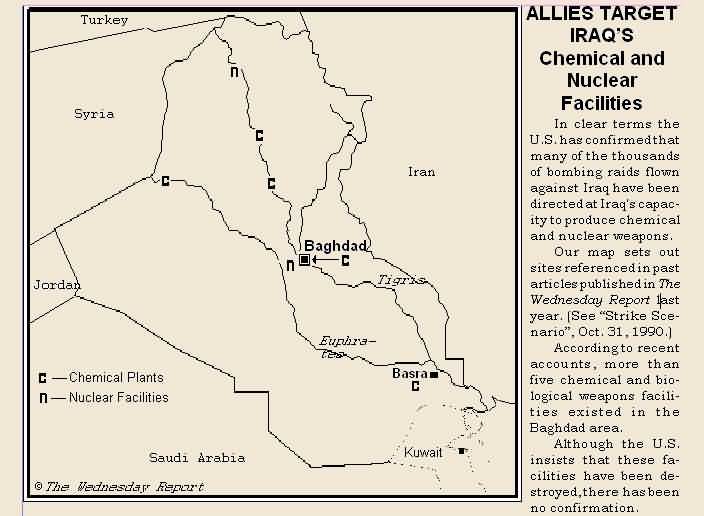![]() Home | Back to TWR Index | Email | The Editor | History | Gulf War
Index
Home | Back to TWR Index | Email | The Editor | History | Gulf War
Index

![]()
militarily fatal blow. Consequently he thumbs his nose at the West. He hideously pollutes the Persian Gulf; terrorizes Israeli, Turkish, Saudi and Bahrainian citizens; and he insists that he will win the war and hold Kuwait.
Saddam may not be a well-schooled military tactician nor a qualified strategist, but he most certainly has an uncanny ability to sense weakness in his enemies. He studied the Viet Nam war's terror-tactics and has taken many a lesson from the Soviets who quickly became absent from the Gulf. He applied his own political savvy and a keen mastery of the grotesque. Now the West watches in bewilderment as Iraq oozes unorthodoxy. In the meantime Saddam and his principal military assets languish in underground shelters, waiting...
Perhaps he believes that in order to fulfill his life-long ambition of becoming potentate of a united Arab world he must do battle with the U.S. — not necessarily beating the U.S., but fighting it and the "Zionist invaders" vigorously. Throngs of Islamics believe he is doing just that.
Are we of the West "step-by-step" walking into a pit Saddam has long prepared for us? In a public battle with Toronto broadcaster Peter Worthington, the CBC has been broadly accused of taking an anti-American stance in its Gulf coverage. The CBC's approach, which is not unlike many of the demonstrators seen in major western cities whom Saddam has publicly thanked, may be proof positive that Saddam is winning, not losing "step by step" as George Bush has declared.
One must remember that Saddam measures his success rate not with opinion polls but with real live steamy masses of chanting Moslems — millions of them. Winning the propaganda war, which for his goal is everything, could be all that Saddam wants or needs.
Anxiety over vignettes of brutalized American and British PoWs is repeatedly fed by CBC Newsworld. On Monday night at 22:15 EST and Tuesday morning at 02:35 it was still giving us doses of those same pictures first foisted on the West by Saddam a week earlier. And as CBC
Volume 5, Number 5 January 30, 1991
Comment:
IF ROUND TWO IS A DRAW ...
It has nothing to do with religion per se, but it has everything to do with what religion stands for — good versus evil, right versus wrong... It is a just war... Good will prevail." - U.S. President George Bush
Bush's words, however you regard them, confirm that hope for avoiding a major land-war in Kuwait is fading each day Saddam plays possum — a hurt possum with a taunting sneer.
Saddam's boldness might come from hidden stockpiles of Soman, Tabin and Sarin or perhaps is derived from knowing there are 500,000 land mines and oil-filled trenches waiting to foil allied troops should they cross the Saudi Arabian border into Kuwait. Certainly any entrenched defender would have an intrinsic tactical advantage, but Saddam seems to think that his is even greater. Nonetheless, whether his brashness is justified or not it is clear that if coalition forces launch a heavy land-force assault into Kuwait, Saddam will again have got what he wants.
Although persistent bombing raids have inflicted sizable damage to Iraq's tools-of-war and even to Iraq's population, Saddam has withstood a massive aerial bombardment without taking a
